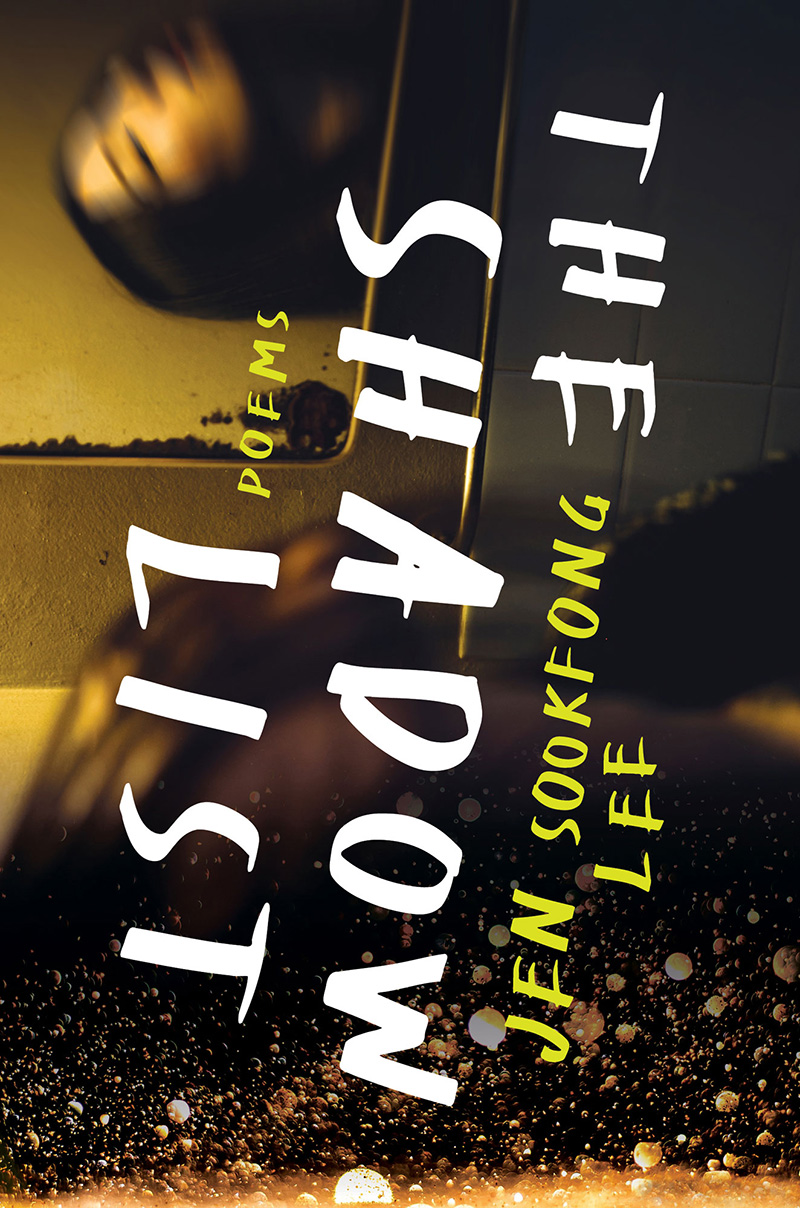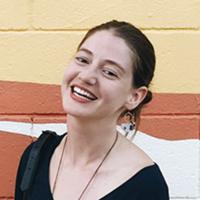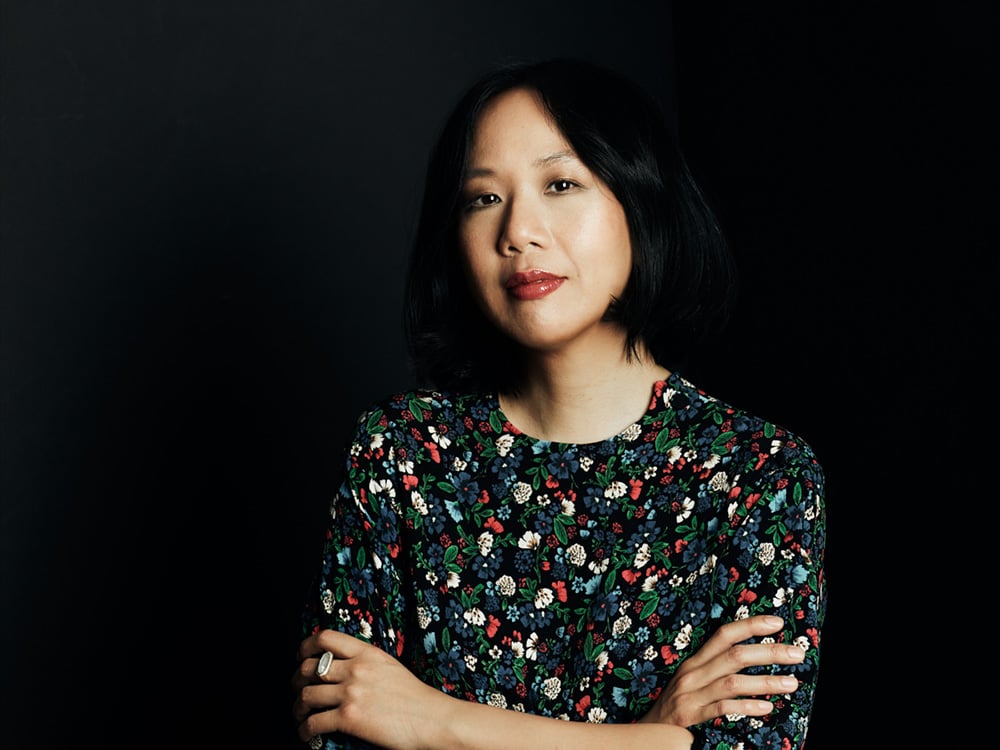Jen Sookfong Lee is having a busy year: her non-fiction children’s book, Finding Home: The Journey of Immigrants and Refugees, will be released March 16, and her debut poetry collection, The Shadow List, will be released in April. Next spring will see the publication of her memoir in essays about pop culture, Superfan. Oh, and she’s in the middle of writing another novel.
But somehow, the author of the acclaimed novels The End of East (2007), The Better Mother (2011) and The Conjoined (2016) does not think of herself as a particularly prolific writer.
“I’m not,” she protests. “All of these books have been years in the making, but COVID delayed the two coming out this season. I haven’t released a book in a while.” Except, she notes, a baby book about the Chinese zodiac in 2018. “But that thing is like, 120 words.”
When she’s not writing, or interviewing Ethan Hawke about his debut novel, or co-hosting a CanLit podcast, she somehow finds time for reading.
“I get sent a lot of free books,” she says, “Which is nice. It’s a perk of the job. But I don’t always want to read what I get sent.”
So what does she want to read? From heartbreaking writing that tears your heart out and eats it raw, to bad mothers, to smut (as long as it’s good smut), The Tyee found out in a recent interview.
Michelle Cyca: How would you describe your literary tastes?
Jen Sookfong Lee: I mostly read novels — my favourites are really immersive novels that have a lot of different layers in terms of setting and character, and all those fictional elements. I look for something that will suck me in and not let me go.
The last one was Songs for the End of the World by Saleema Nawaz, which is a pandemic novel. Oddly, she wrote it before any of this happened. It’s not that she was predicting the future, but she did a lot of research into pandemics and viruses like COVID. It’s a fascinating read, and it follows something like five protagonists and their experiences through the pandemic.
The other one that knocked me off my feet recently is How Much of These Hills Is Gold, by C Pam Zhang. It’s so good! It’s about two siblings who are children during the Gold Rush times during pioneering, Wild West America. It’s a kind of reimagining of what that life would have been like for a Chinese-American family.
What about when you were growing up? What did you like to read?
My favourite, favourite — my number-one, if I was eight-years-old again — was Harriet the Spy, by Louise Fitzhugh. I’ve re-read it as an adult and it’s fascinatingly subversive in a way I didn’t appreciate at age eight.
Harriet’s a non-conforming little girl, but if you saw her through a 2021 lens, you might think maybe she is non-binary or gender non-specific. And her best friend, Sport, is a boy who has all these traditionally feminine interests and characteristics. I loved that book partly because I felt like I didn’t conform to what a little girl should be.
Also, Anne of Green Gables, by Lucy Maud Montgomery. I started reading it when my dad was diagnosed with cancer. I was about eight. And she’s an orphan, of course, and my dad would eventually die four years later. I read that series of books over and over again, over those four years.
One more is The Secret Garden, by Frances Hodgson Burnett. It made me really idealize what Northern England is like, which is actually probably not that pleasant. I’ve actually been there, and I remember it not being particularly pleasant.
Do you remember the book that made you want to be a writer?
There were a lot of them, but when I was an older teenager, I read Disappearing Moon Cafe, by Sky Lee. That was formative for me. I was 19 or 20 when that came out.
What it did for me was show me that women, and specifically Chinese-Canadian women, didn’t have to write The Joy Luck Club over and over again. No shade to Amy Tan, I love The Joy Luck Club, it busted the door open for so many of us and it’s just a good story. But with Disappearing Moon Cafe there was a lot going on with sexuality, with pushing back against model minority myths.
It’s sort of the anti-Canadian Literature book. When I was an English major in university, so much of what we talked about was the kind of CanLit that Margaret Atwood and Northrop Frye popularized. The garrison mentality, us-versus-the-landscape, and all that sort of thing. Disappearing Moon Cafe wasn’t like that. First of all, they were Chinese-Canadian characters, but also, the landscape — it was as if they were being consumed by the landscape. Not in a sinister way, but a merging of self and setting.
I loved that book and it changed everything for me, in terms of what I wanted to write and how I wanted to write it.
The other one was a collection of poetry called Stilt Jack, by John Thompson. Again, I was 19 or 20 when I read that. He was a poet from New Brunswick and was the typical grumpy male poet who lived in a shed, chopped wood, drank a lot of whisky. You wouldn’t think I’d care about it, but he wrote these really image-based, disjointed poems that had so much to do with, literally, chopping wood and drinking whisky. It was this unapologetic writing of the self, and the self’s obsessions. I found it really inspiring in terms of the styles I wanted to do. It was aspirational to me to think about writing exactly what you want without worrying about how others will perceive you.
How do you choose what to read next?
For me these days, it’s a question of, “Am I excited to discover a new writer who is writing on topics I’m interested in? Am I intrigued by the forms that they’re using? Have I heard a lot about this book?”
Right now I’m reading Satellite Love, by Genki Ferguson. They’re a Vancouver writer. It’s brand new, and it’s about a young girl in Japan who falls in love with a satellite, like in the sky. And they have a relationship! It’s the kind of weird stuff that I enjoy.
The book is so far really cool. A weird premise always gets me — not shocking, like a true crime documentary, I don’t like that kind of thing. I like things that are weird.
Are there any new writers you’ve discovered who you’re particularly excited about?
One is Kawai Strong Washburn. His novel is called Sharks in the Time of Saviours. He’s from Hawaii originally, and it’s his first novel, and it was such a fascinating story of migration. It’s essentially about what happens to a family whose children all move away from Hawaii to what they call the mainland, and what happens to them as they become adults, and their connection to their family and mythology. In that book, the family mythology is outsized and giant, and it’s essentially that one of their children is the saviour of their people. When he was a child, he fell off a boat and a group of sharks saved him and brought him back and didn’t eat him. Really, it’s the idea of a family mythology writ large. That book, from a new writer, just blew my mind.
You grew up in Vancouver — what are your favourite books about the city?
You know, there are so many writers in Vancouver, and so few of them set their books here. But I would say Wayde Compton’s short story collection, The Outer Harbour, and also Port of Being, by Shazia Hafiz Ramji.
They’re both quite literary, but both show a version of Vancouver that people don’t really consider, which is always my interest when writing about Vancouver. You know, we don’t need to write about Yaletown bros, or the parts of Vancouver that are so visible. I’m interested in the parts of Vancouver that are more invisible. No shade to the bros of Yaletown.
I love your Lunar New Year horoscopes. When you’re writing a book, do you ever think about the astrological backgrounds of the characters?
Sometimes, but I don’t think about it until after their character is written. The one thing I do think of every single time is: what kind of car do they drive? Which is kind of weird — I don’t even own a car. But I find every author who writes fiction has a way of getting into their characters; the one or two questions they always ask themselves. For me, I think about it deeply — what colour, what’s the interior, how do they drive it, where do they park it? It reveals a lot about them. And consequently, I know a lot more about the makes and models of cars than you would expect from someone who doesn’t have one.
Your work spans a lot of genres — you’ve written a baby book, a YA novel, adult fiction, non-fiction, and now poetry. You’ve edited an anthology. Any other genres that you’d like to explore?
I’ve always wanted to write a literary biography of another writer. Rosemary Sullivan wrote a biography of Gwendolyn MacEwan called Shadowmaker.
Gwendolyn MacEwan was a poet, she died young. She was one of the youngest poets to be nominated for the Governor General’s Award. She was a contemporary and good friend of Margaret Atwood, and was really weird, like super-strange in a very charming way. She travelled a lot and lived on nothing. She was one of those poets who was just a poet, so she struggled with poverty. And her work definitely got overshadowed, and she died before she could really reap those rewards of being a poet who had been around for a long time.
Her most famous poem is “Dark Pines Under Water,” but I don’t believe it’s her best poem. My favourite of hers is “The Shadow-maker,” but I think maybe her best work is her long poem, “The T.E. Lawrence Poems.”
In my brain, [Shadowmaker] is one of the best literary biographies ever. I’ve read a lot of them, and that’s my gold standard. And I would love to do that for an author that I feel has been a little under-appreciated. That would be a lot of fun. Now that I’ve said that I’ll have to do it.
Speaking of poetry, The Shadow List is your first book of verse. Were there poets who inspired you?
Gwendolyn MacEwan for sure, John Thompson’s Stilt Jack. But I don’t read poetry like a really poetic poet, if that makes sense. One contemporary poet who flipped the switch in my brain in terms of what I could write is an American poet, Kim Addonizio. I was introduced to her through a friend, and I just remember reading these poems about female desire, and the idea that it’s revolutionary to be able to express it. By Grand Central Station I Sat Down and Wept, by Elizabeth Smart, was also a huge influence. Even though that’s not really poetry, but it kind of is.
We have all these great poetry collections by white women exploring desire, and sexuality, and misbehaviours, and I’ve always felt that Asian female writers have not been allowed to misbehave on the page. So the question I was asking myself was: could I write a book, like those white women poets, and make it as openly desirous, and physical, and visceral and get away with it?

Are there other Chinese-Canadian or Chinese-American authors who you think are breaking those boundaries too?
Charles Yu, whose book Interior Chinatown just won the National Book Award. He’s great. Love him. He’s also just the nicest dude.
Also Alexander Chee — he’s not Chinese but he’s Asian-American — is a huge influence for me and for real interesting younger writers who are emerging now.
I’ve always had a really soft spot for Wayson Choy, specifically because his version of Vancouver’s Chinatown was very close to the version I grew up in. I found it really fascinating that he wrote a place that I knew so well, that seemed regular and boring, and he made it interesting. That was huge for me.
In terms of contemporaries, Doretta Lau and her short story collection, How Does a Single Blade of Grass Thank the Sun? I love that book so much, it did so much for the ways in which we view Chinese-Canadians.
Oh, and I can’t leave out Nancy Lee! Dead Girls, her short story collection, did so much for me.
You mentioned in an interview that you have an obsession with "bad mothers." Who are some memorable bad moms in fiction?
Hagar in The Stone Angel by Margaret Laurence is just the worst. She’s such a bad mom, but I love her.
Also, I don’t know how many people have read this book, but The Blue Castle by Lucy Maud Montgomery. It’s not an Anne of Green Gables book, and her main character, Valancy’s mother, is god-awful — but hilarious! Lucy Maud Montgomery wrote a lot of books besides Anne of Green Gables. She was very prolific. And actually, bad mothers were a theme for her too.
The Shadow List confronts the emotional wreckage of heartbreak, so I want to ask: Do you have a beloved book that really devastated you?
So many! Fall on Your Knees, by Ann-Marie MacDonald. That book will tear your heart out and eat it raw. Also, A Fine Balance, by Rohinton Mistry. People don’t talk about that book anymore! But that is some kind of tearjerker, man. If you really need to feel some stuff, that is the book for you.
Also recently, Brother, by David Chariandy. That’s a tearjerker. People don’t think of it that way, but it’s very sad. For me, a sad book is one where people die untimely deaths, and people are ruined.
What book do you love to give as a gift?
Vancouver After Dark, by Aaron Chapman, about the history of nightclubs in the city. I’ve given that book to two people.
Has anyone given you a perfect book as a gift?
People don’t usually give me books, unless they’re writers, but my partner gave me the book that Robyn Crawford wrote, My Life with Whitney Houston. That was the best gift.
Speaking of pop culture books, you have another book coming out in 2022, Superfan, which is a memoir in essays about your love of pop culture. Is the Whitney book your favourite in that genre?
No, that’s not my favourite — my favourite pop culture book is Last Night at the Viper Room, by Gavin Edwards. It’s the book he wrote about River Phoenix’s death.
Any last favourites you just have to mention?
I always like to give a shout-out to the book I first read that taught me about sex scenes, which is I’ll Take Manhattan by Judith Krantz. Also, her book Scruples. I started reading her when I was about 10 or 11, far too young. But my older sisters were reading her books, and they would leave their books just lying around. I picked one up and realized they had these really graphic sex scenes in them — and all kinds of sex scenes! Any setting you want, any kind of participant, they had everything! They’re all set in the excess of the ’80s in New York City, and I was just fascinated.
If people want to know, “What is one of the most formative books you’ve ever read?”, it was the novels of Judith Krantz when I was a child. Just if anyone thinks I’m only literary, because I’m not. I’m into smut. It has to be good smut, though. ![]()
Read more: Media


















Tyee Commenting Guidelines
Comments that violate guidelines risk being deleted, and violations may result in a temporary or permanent user ban. Maintain the spirit of good conversation to stay in the discussion.
*Please note The Tyee is not a forum for spreading misinformation about COVID-19, denying its existence or minimizing its risk to public health.
Do:
Do not: